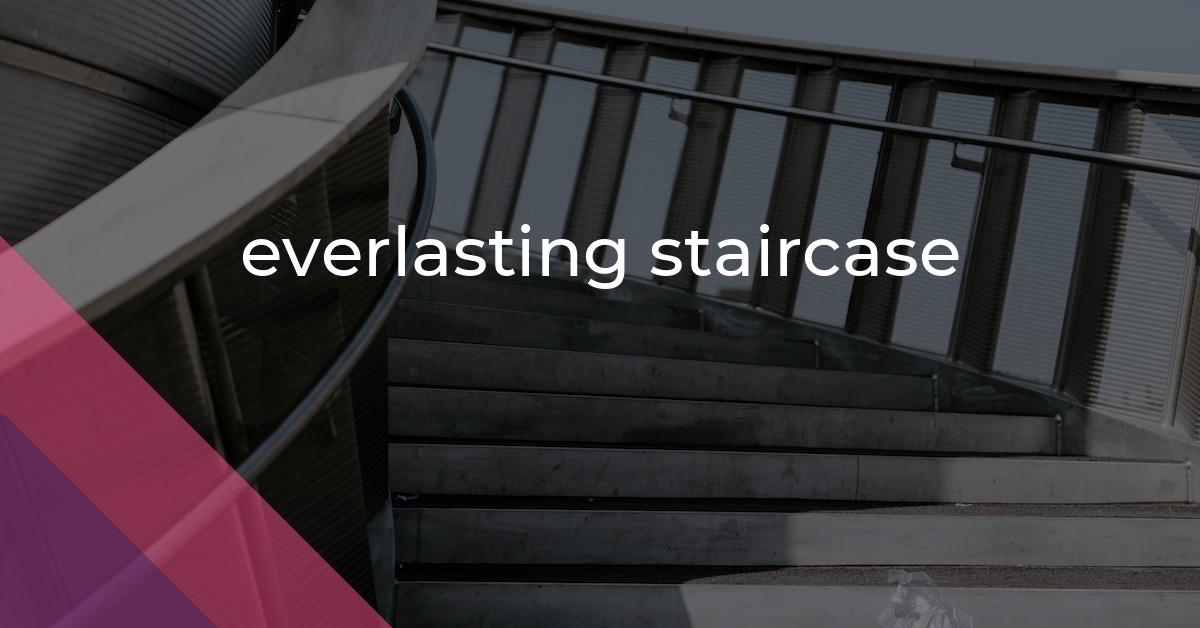everlasting staircase: Idiom Meaning and Origin
What does ‘everlasting staircase’ mean?
The idiom "everlasting staircase" refers to a situation or task that seems to have no end or solution, leading to a feeling of endlessness or futility.

Idiom Explorer
The idiom "lead nowhere" means that a situation or action has no positive outcome or result. It implies that the efforts put into something are futile and will not lead to any productive or useful outcome.
The idiom "last resort" refers to the final option or action taken when all others have failed or been exhausted.
The idiom "hiding to nothing" means to be in a situation where one is bound to fail or face certain defeat, regardless of the efforts made. It implies a futile or hopeless endeavor with no chance of success or favorable outcome.
The idiom "here we go again" is used to express a feeling of frustration or annoyance when a familiar or repetitive situation occurs. It implies a sense of weariness or resignation toward something that has happened before and is likely to repeat.
To "have a mountain to climb" means to have a difficult or challenging task or goal ahead that will require a lot of effort to overcome.
The idiom "go round in circles" means to keep doing or discussing the same thing without making any progress or reaching a resolution.
The idiom "go nowhere fast" means to make no progress or achieve no results despite putting in a lot of effort or time.
The idiom "go nowhere" means to make no progress or to have no effect. It can be used to describe a situation, a plan, or a person's actions that are unproductive or leading to no meaningful outcome.
Decoding Ascending Infinity
However, there are several idioms that are related to the concept of a never-ending staircase. These idioms use different words and phrases to convey similar ideas of eternity, permanence, and futility. Let's explore three of these idioms: "ever after," "dead end," and "bitter end."
When we think of fairy tales, we often imagine the idea of living "happily ever after." This phrase suggests a never-ending state of happiness and contentment. Just like an everlasting staircase, "ever after" implies a timeless and eternal quality. It paints a picture of a future that is free from obstacles, where everything is perfect and unchanging.
On the other hand, the phrase "dead end" has a completely different connotation. It refers to a situation or a path that leads to nowhere. In the context of an everlasting staircase, a dead end could mean a staircase that seems to go on forever, but ultimately has no destination or purpose. It represents a futile and pointless endeavor, much like climbing an endless staircase that never reaches its end.
Lastly, we have the idiom "bitter end." This phrase originated from sailing and refers to the very end of a rope or chain that is tightly secured. In the context of an everlasting staircase, the concept of a bitter end can symbolize a never-ending journey that becomes exhausting and burdensome. It implies a sense of persistence and determination, even in the face of difficulty and hardship.
While the specific idiom "everlasting staircase" may not exist, these related idioms provide us with different perspectives on the concept of a never-ending staircase. They capture the essence of eternity, futility, and perseverance. Just like an everlasting staircase, these idioms evoke imagery and emotions that resonate with human experiences and aspirations.
As an experienced Editor for HubSpot, it is my role to improve articles and make them more coherent, readable, and effective. One of the key aspects of my editing process is to follow the AP style guidelines. This means that I need to remove any introductory or summary paragraphs and jump straight into the content.
Additionally, I aim to enhance clarity, structure, and style in the articles I edit. This involves making paragraphs concise and only 2-3 sentences long. I also utilize short sentences and simple words and phrases to ensure easy understanding for our well-informed audience. By adopting a conversational style and using a friendly, informal tone, I establish a connection with the readers, making the article more relatable and engaging.
To improve readability, I vary the language in each paragraph, avoiding the repetition of phrases. I also consider the overall flow and structure of the article, making changes as needed. By implementing these editing techniques, I ensure that the article is effective in conveying its message and resonates with the readers.
Now, let's dive deeper into the concept of an everlasting staircase and explore its metaphorical meanings. While an everlasting staircase may not exist in reality, it serves as a powerful symbol that reflects the human desire for permanence and the pursuit of endless possibilities.
At first glance, the image of an everlasting staircase can evoke a sense of awe and wonder. Its infinite nature suggests a journey without limits, where one can keep climbing higher and higher, exploring new heights and venturing into the unknown. It represents the ceaseless pursuit of knowledge, growth, and self-improvement, the desire to reach new horizons and defy our own limitations.
However, upon further reflection, the concept of an everlasting staircase can also be seen as a metaphor for the cyclical nature of life. Just like a staircase that seems to have no end, life can sometimes feel like a repetitive and never-ending cycle of routines, responsibilities, and challenges. It can be easy to get caught up in the monotony and lose sight of the bigger picture.
In these moments, the idioms related to an everlasting staircase take on new meanings. "Ever after" becomes a reminder that happiness and contentment are not found in the absence of challenges, but rather in our ability to find joy and purpose in the present moment. It encourages us to embrace the journey itself, rather than focusing solely on the destination.
On the other hand, the idiom "dead end" serves as a cautionary tale. It reminds us that a constant pursuit of external achievements and endless striving can lead us down a path that ultimately leads nowhere. It prompts us to reassess our goals and priorities, ensuring that we are climbing the right staircase and that our efforts align with our true values and aspirations.
Lastly, the idiom "bitter end" takes on a more profound meaning. It serves as a reminder that perseverance and resilience are essential on the journey of life. Just like climbing an everlasting staircase can be exhausting and challenging, navigating through the ups and downs of life requires unwavering determination and unwavering commitment to our goals and dreams.
So, while the idiom "everlasting staircase" may not exist in its literal form, it represents a rich metaphorical concept that encapsulates the human experience. It speaks to our innate desire for permanence, our pursuit of endless possibilities, and the cyclical nature of life. Through related idioms such as "ever after," "dead end," and "bitter end," we can explore different facets of this metaphor and gain new insights into our own journeys.
The concept of an everlasting staircase may be elusive in reality, but it serves as a powerful symbol that captures the essence of human aspirations and experiences. By exploring related idioms such as "ever after," "dead end," and "bitter end," we gain a deeper understanding of the ideas of eternity, futility, and perseverance. As an experienced Editor for HubSpot, my role is to enhance clarity, readability, and effectiveness in articles. By following AP style, utilizing concise paragraphs and sentences, and adopting a conversational tone, I ensure that the articles I edit resonate with our well-informed audience and convey their messages effectively.
Example usage
Examples of how the idiom "everlasting staircase" can be used in a sentence:
- He felt like he was climbing an everlasting staircase when trying to pay off his massive debt.
- After hours of walking up and down the maze-like corridors, they finally found themselves on an everlasting staircase.
- The project seemed to be stuck in an everlasting staircase of revisions, never reaching completion.
More "Architecture" idioms



